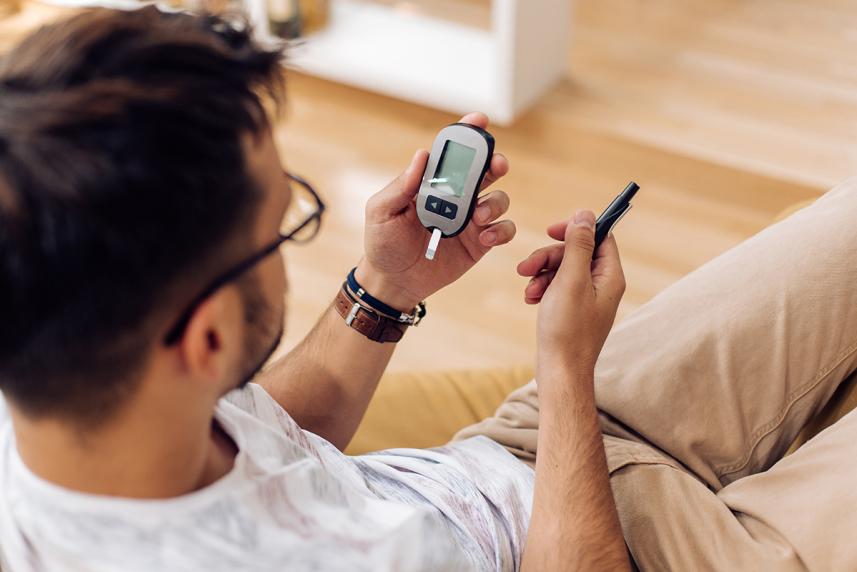3 Steps to Take After a Diabetes Diagnosis
Here’s some good news: With diabetes, you don’t have to rely solely on medication to feel better. Taking these first steps after a diagnosis can help you take back control of your health.

One of the most important things you’ll learn when you have diabetes is that it’s not a “set it and forget it” condition, says Gina Trignani, RD. Trignani is director of training and health capacity-building at the Health Promotion Council in Philadelphia. As life changes, you may have to adjust how you handle your diabetes. That’s perfectly normal. But what’s important is knowing that you can manage your condition.
That’s true whether you have type 1 or type 2 diabetes. With type 1 diabetes, your body doesn’t make enough — or any — insulin. (Insulin is a hormone that helps your body use glucose, or blood sugar, for energy.) With type 2, your body doesn’t respond to insulin the way it should. Both types can cause high blood sugar levels if left untreated. Over time, that can lead to serious health issues, such as heart disease, kidney disease, and vision loss.
Taking control of your diabetes calls for the right combination of diet, healthy habits, and medications. “A healthy, happy life with diabetes is possible,” says Trignani. The key is to learn as much as you can and find ways to stay motivated. Here are some tips to get started.
Get Comfortable with Blood Sugar Testing
To prevent or delay complications from diabetes, you’ll want to keep your blood sugar within a certain range. Your doctor or diabetes educator will talk to you about a goal range. They will also show you how to test your blood sugar.
That typically means using a lancet (a small needle) to prick your finger. Then you squeeze a tiny drop of blood onto a testing strip that you’ve inserted into a glucometer. The glucometer will give you an instant reading of your blood sugar.
You should test throughout the day to make sure your blood sugar is within your goal range. Your doctor may offer tailored advice. But in general, testing is recommended:
- When you first wake up.
- Before a meal.
- 2 hours after a meal.
- At bedtime.
Your doctor may ask you to track your blood sugar numbers over time. They may also ask you to keep a record of what you eat and when you exercise. Having this information can make it easier to spot trends and changes. If something looks off, you can change your diabetes management plan as needed.
In some cases, your doctor may suggest a small wearable device called a continuous glucose monitor. To use it, your doctor places a small sensor under your skin. It automatically collects real-time readings 24 hours a day.
Build Your Diabetes Care Team
It can feel like there’s a lot to manage with diabetes. But keep in mind that you won’t be doing it alone. Your healthcare team can give you the support and education you need to take care of yourself. That team might include:
- Diabetes care and education specialist: This is a trained healthcare professional who focuses on diabetes management. They can help you get comfortable with your glucometer and spot trends in your blood sugar levels. They can also explain how things such as stress or sickness might affect your diabetes. Meeting with a diabetes care and education specialist is covered by most health insurance plans.
- Endocrinologist: These doctors specialize in hormones such as insulin. Many people can manage their diabetes with their primary care physician and never see an endocrinologist. But perhaps your doctor doesn’t have much experience with diabetes. Or maybe you have complications or difficulty managing your condition. In that case, they may refer you to an endocrinologist.
- Podiatrist: If your blood sugar stays high over a long period, it can restrict blood flow to your feet and cause nerve damage. Your doctor may do diabetic foot exams to look for issues such as nerve damage, infection, or injury. Or they might refer you to a podiatrist (foot doctor) to get regular screenings and care.
- Ophthalmologist: Over time, high blood sugar levels can damage the blood vessels in your eyes. An ophthalmologist is trained to find subtle changes in your eye health. Catching changes early can help fend off or delay diabetes-related vision loss.
- Pharmacist: Your local pharmacist is an important part of your team. They can talk with you about your medications. For example, they can answer questions about side effects or interactions with other medications or supplements.
- Mental health professional: People with diabetes are 2 to 3 times more likely to have depression than those without diabetes, according to the Centers for Disease Control and Prevention (CDC). That’s why it’s so important to have someone you can turn to for support. Seeing a licensed mental health professional is often covered by health plans. That might be a clinical social worker, therapist, counselor, or psychologist. You can also ask your doctor for recommendations about free support groups.
If possible, build a team within a single hospital system or health system. That makes it easier for your doctors and other specialists to share information and work together. It can also help you save on out-of-pocket costs.
You can always ask your doctor for a referral, but they might not know who’s taking new patients. Another helpful tool: Wellframe, your digital health management app. Wellframe is included in your health plan. You can use it to search for in-network specialists or send a secure message to your care navigator for a recommendation.
Embrace Healthy Habits
Everything from stress and smoking to movement and medications can impact your diabetes. But that doesn’t mean you have to overhaul your habits all at once. Making healthy tweaks over time can help you get control of your condition. Here are some good goals to aim for.
- Eat well. Your healthcare team will give you a personalized meal plan. That may mean eating a set number of carbohydrates at certain meals. They can also offer handy tips, such as filling half your plate with non-starchy vegetables and avoiding juice and soda. How you eat has a direct impact on your blood sugar levels. Make sticking to your meal plan a priority.
- Stay active. Exercise helps your body use insulin more efficiently. It can lower your blood sugar quickly and help keep your levels steady for hours afterward. That doesn’t have to mean a grueling hour of doing something you hate.
“Picking something that you enjoy is key,” Trignani says. The more you like it, the more likely you’ll be to stick with it. The goal is to work up to 150 minutes of activity each week. But start at your current fitness level, where you feel comfortable. Every minute of movement does your body good.
- Manage your weight. Being overweight or obese makes it harder for your body to use the insulin it does produce. You don’t have to hit an ideal number on the scale to see benefits. Losing 5% to 10% of your body weight may improve diabetes management for people who are overweight.
- Mind your meds. Some people can manage their diabetes through lifestyle changes. Others need medication to keep their diabetes in check. If your doctor prescribes pills or injections, make sure you understand exactly how and when those medications should be taken. Then find a system that helps you stick to your medication schedule. Your Wellframe app has reminder and tracking tools to make this easier.
- Kick the tobacco habit. People with diabetes who smoke have a harder time managing their condition, according to the CDC. They’re also more likely to have other health problems. One example: kidney disease and poor blood flow in the legs and feet, which can lead to ulcers and infections.
When you’re ready to quit, you have options for support. Talk to your doctor about which stop-smoking plan is best for you.
- Deal with stress. Stress can be a 1-2 punch to diabetes management. When you’re stressed, you may have a harder time sticking to your meal and exercise plans. And stress itself can lead to higher blood sugar levels.
Of course, no one can be 100% stress-free. But you can find ways to better cope with stressful situations as they arise. Do you prefer meditation, yoga, talking to a therapist, or daily walks? If it’s healthy and it works for you, go for it.
Remember: There’s a lot you can do to take control of your diabetes. But if you think something you’re doing isn’t working, or you have questions or concerns about your condition, talk to your healthcare team. They are there to help.
Sources:
[1] “Type 2 Diabetes.” Centers for Disease Control and Prevention. August 10, 2021, https://www.cdc.gov/diabetes/basics/type2.html. Accessed September 1, 2021.
[2] “Manage Blood Sugar.” Centers for Disease Control and Prevention. April 28, 2021, https://www.cdc.gov/diabetes/managing/manage-blood-sugar.html. Accessed September 1, 2021.
[3] “Find a Diabetes Education Program in Your Area.” Association of Diabetes Care & Education Specialists, https://www.diabeteseducator.org/living-with-diabetes/find-an-education-program. Accessed September 1, 2021.
[4] “When Should You See a Diabetes Specialist?” University of Utah, https://healthcare.utah.edu/utahdiabetescenter/when-should-you-see-diabetes-specialist.php. Accessed September 1, 2021.
[5] Huang DY, Wilkins CJ, Evans DR, et al. “The Diabetic Foot: The Importance of Coordinated Care.” Seminars in Interventional Radiology, vol. 31, no. 4, 2014, https://www.ncbi.nlm.nih.gov/pmc/articles/PMC4232430/. Accessed September 2, 2021.
[6] Wondmkun YT. “Obesity, Insulin Resistance, and Type 2 Diabetes: Associations and Therapeutic Implications.” Diabetes, Metabolic Syndrome and Obesity: Targets and Therapy, vol 13, 2020.
[7] “Living Healthy with Diabetes.” American Heart Association. May 6, 2021, https://www.heart.org/en/health-topics/diabetes/prevention--treatment-of-diabetes/living-healthy-with-diabetes. Accessed September 1, 2021.
[8] “Smoking and Diabetes.” Centers for Disease Control and Prevention. August 11, 2021, https://www.cdc.gov/tobacco/campaign/tips/diseases/diabetes.html. Accessed September 1, 2021.
[9] “Diabetes and Mental Health.” Centers for Disease Control and Prevention. May 7, 2021, https://www.cdc.gov/diabetes/managing/mental-health.html. Accessed September 1, 2021.
[10] “Statistics About Diabetes.” American Diabetes Association. March 22, 2018, https://www.diabetes.org/resources/statistics/statistics-about-diabetes. Accessed September 1, 2021.
[11] “Continuous Glucose Monitoring.” Cleveland Clinic. July 7, 2021, https://my.clevelandclinic.org/health/drugs/11444-glucose-continuous-glucose-monitoring. Accessed September 1, 2021.



